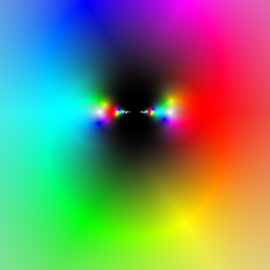How is the copyright determined for images that are derived from math formulas?
Examples:
Equal-step gradient graph:

color wheel graph of sin(1/z):

Who own the rights to images like these?
The creator of the image is the copyright owner. But, there are a few tricks.
Of the two images, I'd say the first one is generic enough that many people no doubt have created a similar image, and it would be fairly safe to use.
The second shows some real creativity. Anyone who could create the right formula could own the copyright to the image they generated. If a person finds a similar formula, then they own the copyright to produce their new image.
sin(1/z) ? Is the formula part of an expression or part of an idea?
Intellectual property laws are constructions of their time. It is becomming increasingly evident that the base asumptions they make do not always apply. You have hit on one of the corner cases.
Who is the inventor/artist when the machine did it? In general its the owner of the program. There are also experiments where the whole job of generation and selection is based on data the computer gathered based on logic that stretches the concept.
It is also possible that the maker of the software owns the rights. In any case if its very generic it may not be owned by anybody. There are 2 questions that govern this.
can you claim ownership of something many people have done and can easily do.
is there any benefit for you to claim this ownership
So yes while you could own the thing. Can you really defend your right and do you want to?
sin(1/z)is the "idea" and not the "expression", then with that "idea" anyone would derive the same and equal "expression"